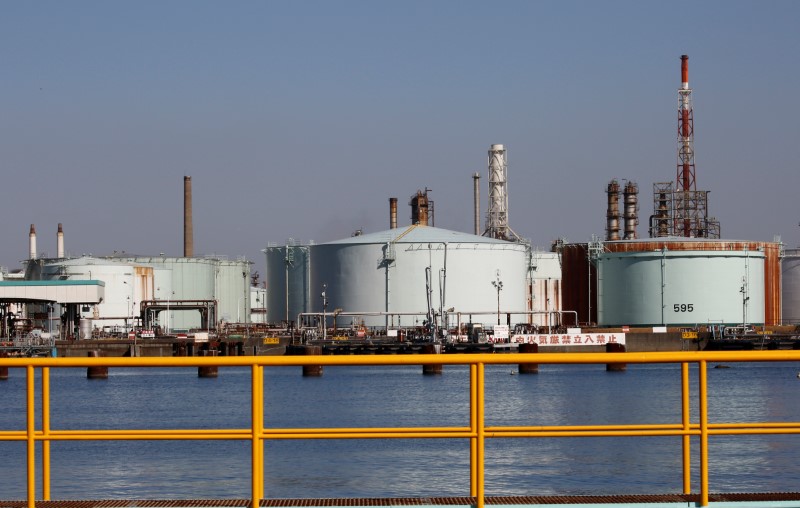
Investing.com — Oil prices fall to a new 21-year low, as the world runs short of storage capacity. The U.S. Senate may approve a deal to top up the emergency bailout fund for small businesses, and the administration is deferring more Chinese import tariff collection. China cut its key rate, and the ECB is looking for ways to stop eurozone banks drowning in bad debt. U.S. stock markets are set to open lower ahead of a pivotal week for earnings: Halliburton (NYSE:HAL), IBM (NYSE:IBM) and Equifax (NYSE:EFX) will all report today. Here’s what you need to know in financial markets on Monday, April 20th.
1. Last Contango in Texas
The price of crude oil fell as much as 10% as traders scrambled to get out of futures positions in order to avoid taking physical delivery of cargos that they can neither sell nor store.
The front-month May contract for West Texas Intermediate, the U.S. crude benchmark, which expires on Tuesday, fell as low as $13.31 before rebounding a touch to trade at $13.34 by 6:45 AM ET (1045 GMT). That’s a discount of more than $9 a barrel to the June contract, where most open interest and volume is concentrated.
The June contract in turn trades at an almost $5 discount to the July contract, illustrating the acute degree of oversupply in a world where demand has collapsed by nearly 30%. The prices of storing U.S. crude at the national hub in Cushing, Oklahoma is also rising sharply, according to reports, as spare capacity dwindles fast.
2. U.S. close to deal on small business program; more exemptions for importers paying tariffs
The Senate may approve an emergency $300 billion relief package for small businesses, topping up a $350 billion program that was depleted within two weeks. Treasury Secretary Steven Mnuchin said the package, aimed principally at providing payroll support, would also include $75 billion to help overwhelmed hospitals and $25 billion to increase nationwide testing capacity for Covid-19.
In addition, the administration agreed to defer collection of more tariffs from U.S. importers in relation to some Chinese goods in an effort to ease their financial situation. The move is the latest in a series of relaxations that stands at odds with previous claims that the burden of tariffs was borne solely by China.
Over the weekend, the U.S. death toll from the virus topped 40,000. President Trump again deflected criticism of his handling of the crisis onto China, which, he insinuated, may have released the virus deliberately. He provided no evidence for the claims, which he attributed to unnamed others.
3. Stocks set to open lower; Halliburton, IBM earnings due
U.S. stock markets are set to open the week lower, reversing some of Friday’s strong gains, ahead of a pivotal week in the first quarter earnings season.
By 6:40 AM ET (1040 GMT), the Dow Jones 30 futures contract was down 380 points or 1.6%, while the S&P 500 futures contract was down 1.5% and the Nasdaq 100 contract was down 1.0%.
Analysts at TS Lombard in London argue that U.S. stocks have too much confidence in a quick return to normal after the crisis. They estimate that S&P 500 earnings will fall 25% in 2020, which would mean it is currently trading on a forward price-earnings ratio of 24 times. A less ambitious multiple of 16 would imply a year-end close at 1,900, they added.
Oil services company Halliburton will report its first-quarter numbers before the bell, while IBM and Equifax are among those reporting after the close.
4. China cuts again, ECB urges ‘bad bank’ solution
Central banks are still looking for ways to ease the burden on their respective financial systems from the virus. The People’s Bank of China cut its key one-year prime rate by 20 basis points to 3.85%. The move – which was expected – had little impact on the yuan, which fell less than 0.1% against the dollar.
Elsewhere, the European Central Bank has held talks with the European Commission about setting up a regional ‘bad bank’, with a view to shifting some of the worst assets on regional balance sheets in order to make room for new lending as the crisis passes. The Financial Times reported that there had been “stiff” opposition from the Commission.
The Bad Bank would need capitalizing with common funds, effectively shifting the burden of recovery away from weaker financial states to stronger ones. The news comes before yet another EU summit on Thursday.
5. Walt Disney to stop paying 100,000 staff
Walt Disney Company (NYSE:DIS) said it will stop paying around 100,000 staff – half of its overall payroll – in an effort to save half a billion dollars a month at hotels and theme parks ravaged by the Covid-19 pandemic. It will continue to pay their health insurance costs.
Disney’s U.S. and European parks, which generated around half of group operating profit last year, have been shut for the last month, while its ones in Greater China have reopened but are running at much lower visitor numbers.
Disney’s top management have agreed to waive their fixed salary for the rest of the year but have not suspended stock-related bonuses, which account for most of management compensation.



